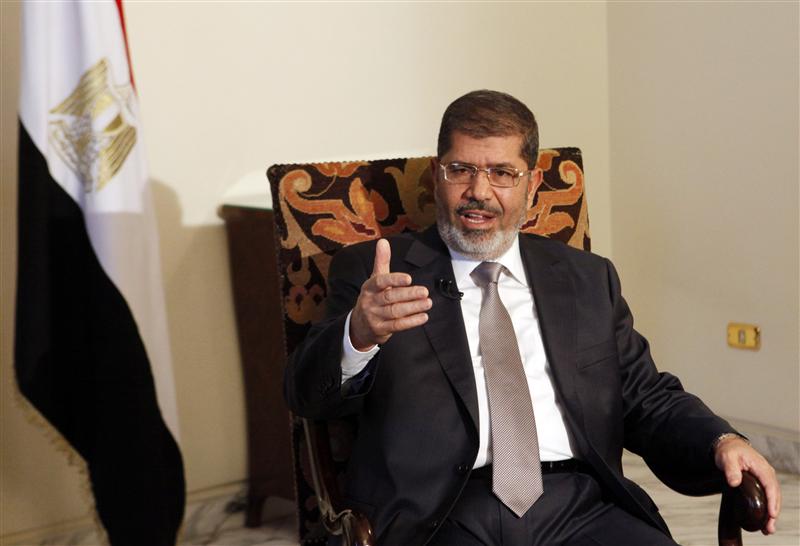Latest NEWS
- Aswat Masriya, the last word
- Roundup of Egypt's press headlines on March 15, 2017
- Roundup of Egypt's press headlines on March 14, 2017
- Former Egyptian President Hosni Mubarak to be released: lawyer
- Roundup of Egypt's press headlines on March 13, 2017
- Egypt's capital set to grow by half a million in 2017
- Egypt's wheat reserves to double with start of harvest -supply min
- Roundup of Egypt's press headlines on March 12, 2017
Morsi rebuts calls for his ouster ahead of 30 June mass protests

Egyptian President Mohamed Mursi - Reuters
Egypt's president, Mohamed Morsi describes the anti-government protests planned for 30 June as "reflective of the freedoms the 25 January Revolution" has brought about.
Furthermore, if the Egyptian people choose another president in the next elections - scheduled for 2016 – Morsi says he will "stay up to ensure power is handed over according to the constitution and the law..to achieve democracy" in an interview with state-owned newspaper Al-Akhbar on Saturday.
Egypt is anticipating mass nationwide protests on 30 June against Brotherhood-fielded President Morsi that aim to force him to step down and hold snap presidential elections.
The protest is spearheaded by the Rebel Campaign, a movement launched in May that aims to withdraw confidence from Morsi by collecting 15 million signatures from citizens to outnumber the 13.2 that put him into office. The campaign has been supported by major opposition groups, including the Egyptian Popular Current and the National Salvation Front. On Thursday they announced they reached their 15 million petition target.
Movement founders and supporters stress that their intentions are peaceful and that they do not intend to engage in violence in the upcoming demonstrations.
Morsi warned the state will take all "legal and organisational procedures to combat violence, regardless of who caused it."
Meanwhile, hundreds of thousands of Islamists gathered on Friday in a pro-Morsi rally in Nasr City, a densely populated Cairo suburb, to "Say no to violence."
Clashes took place elsewhere on Friday between supporters and opponents of the Brotherhood and the president in several cities, including Egypt's second-largest city, Alexandria. Dozens were injured as a result.
Morsi also spoke on his appointment of governors last week that sparked nationwide criticism because seven of the 17 new governors are Brotherhood members.
One particularly controversial appointment was in the tourist town of Luxor that houses many of Egypt's pharaonic temples and tombs. A member of the former militant ultra-conservative group Gamaa Islamiya, Adel El-Khayat was appointed governor.
The group was responsible for the infamous 1997 Luxor attack in which at least 58 foreign tourists and four Egyptians were killed.
Morsi counters, however, that El-Khayat was not convicted in the Luxor accident and was acquitted in the 1981 assassination of President Anwar El-Sadat in which the group was also implicated.
"[The group's] Building and Development Party is part of the civil state and [El-Khayat] was chosen among others who were nominated," Morsi said.
Gamaa Islamiya formally renounced violence in the immediate wake of the Luxor attack. Following Egypt's 2011 popular uprising, which ended Hosni Mubarak's three-decade rule, the group established the Building and Development Party as its political arm.
Morsi also asserts that tourism minister Hisham Zaazou, who submitted his resignation on Wednesday over El-Khayat's appointment, is still in office.
"[Zaazou] attended the cabinet's last meeting and is making a great effort to improve the tourism sector," he said.
In his interview Morsi also said that he would soon unveil "new information about conspiracies plotted against Egypt."
He called upon the "national forces" to stand against such plans and stop those who are behind them from dragging Egypt back into times of "corruption, forging election results, plundering funds and repressing freedoms."
"Egypt as a major country with strong influence in the region is an obvious target," Morsi said, "And in light of the current political situation, the attempts to interfere in our affairs is increasing, but I do not accept that and will work to stand against it."
In addition, the president said that he does not put conditions for talks and hopes for an open dialogue that "fulfils the [25 January] revolution's goals and the people's aspirations."
He also said that the parliamentary elections could be sped up, since it might be able to "unite everyone behind a common goal, despite our differences."
On 21 April Egypt‘s Supreme Administrative Court issued a ruling suspending the country's parliamentary elections. The new electoral law is currently being ratified in the Shura Council (parliament upper house), which is currently endowed with legislative powers. Once passed it should be referred to Egypt's High Constitutional Court.










